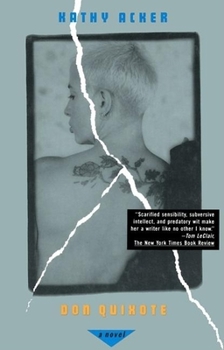Don Quixote, Which Was a Dream
Select Format
Select Condition 
Book Overview
Kathy Acker's Don Quixote is an indomitable woman on a formidable quest: to become a knight and defeat the evil enchanters of modern America by pursuing "the most insane idea that any woman can think of. Which is to love." In this visionary world, Don Quixote journeys through American history to the final days of the Nixon administration, passing on the way through a New York reminiscent of pre-revolutionary St. Petersburg and a brutally...
Format:Paperback
Language:English
ISBN:0802131921
ISBN13:9780802131928
Release Date:January 1994
Publisher:Grove Press
Length:208 Pages
Weight:0.56 lbs.
Dimensions:0.6" x 5.4" x 8.2"
Customer Reviews
3 ratings
Don Quixote wanders through a Hieronymus Bosch painting...
Published by Thriftbooks.com User , 16 years ago
At the core of this novel Kathy Acker states the dilemma succinctly thus: "It can't be mistaken to need someone else to love and yet only human solitariness allows human survival." On every level--the personal, the social, the psychological, the political, the cosmic--this paradox is replayed in Acker's hallucinogenic deconstruction of Cervantes' classic. Of course, there's very little resemblance to the original *Don Quixote* in this postmodern remake--the knight is a woman, the country is America, Sancho Panza is a dog, Nixon is president, and if the Apocalypse hasn't already come it can't be worst than what's already here. But, in spite of it all, wandering haphazardly through this wasteland, Acker's Quixote is still searching for love, communication, and freedom--each and all of which seem to be impossible given human nature and the repressive political, social, and sexual relationships that arise naturally out of our survival-oriented hardwiring for power and domination over others. Patriarchy is to blame for how things are now, but Acker doesn't seem to hold out much hope for how they might be under a matriarchy. Her knight has given up on men, but can't feel the transcendent union she seeks, the transformative love-experience, with women, even if they are safer (safer because she can't truly love them.) Is love a lie, an illusion? Are we condemned to loneliness, silence, despair? Is a retreat into ourselves rather than a quest into the world the only viable road for the seeker now that all roads have been traveled, all leading to the same dead end? Acker paints a grim--if darkly comic--picture in this anti-classic--a sustained nightmare of violence, perversion, sexuality, and criminality written in the style of assemblage: part dream, part journal, part political rant, all Acker. Like all her texts, *Don Quixote* will offend the morally, sexually, and politically sensitive of every stripe. Acker belongs to no party--she's fiercely and defiantly individualistic. Those dependent on a straightforward narrative will likewise be disappointed. Acker's idea of a novel doesn't include characters with only one identity or events which follow logically in sequence, or even one style of writing. The reader comes across plays, poems, mini-history lessons, rewrites of DeSade and more--it's as if her Don Quixote had put together a scrapbook of all he'd seen and experienced on his quest through Hell. And yet, while *experimental* literature can all-too-often be clinical and coldly detached in its ironic and metafictional self-consciousness, Acker writes with real heart and a deep, almost willfully naïve, conviction in her own pursuit of the ideals of love, freedom, and art. Acker's despair at not being loved or understood by anyone may indeed be justified by the facts of her (and our collective human) existence, but in *Don Quixote* she has at least communicated the despair shared by all of us fellow quixotes who've suffered the realization of the n
Postmodern bliss
Published by Thriftbooks.com User , 19 years ago
Kathy Acker is a truly unique writer. She blends classics, politics, surrealism, autobiographical elements, raw emotion, graphic, "pornographic" scenes, humor and much more into strange, memorable and sometimes confusing postmodern literature. Beacause the author often doesn't follow the laws of a linear plot her works can be difficult to get into. But it's worth the effort. There's nothing like Acker's writing.
Great!
Published by Thriftbooks.com User , 26 years ago
If you're on the lookout for a for an unconventional, surreal, thoughtful, shocking, hilarious, crude, sensitive, and generally disconcerting novel/literary analysis/ treatise/social commentary, check out Acker's _Don Quixote_ and you won't be disappointed. Reading and digesting Acker's work can occassionally feel strenuous...this is due to the sheer unconventionality of the novel, but the end result yeilds (often hilarious) new insight and is always worth the effort. The piece is a unique blend of politics and fantasy that is highly entertaining and never mainstream. Highly reccomended.






